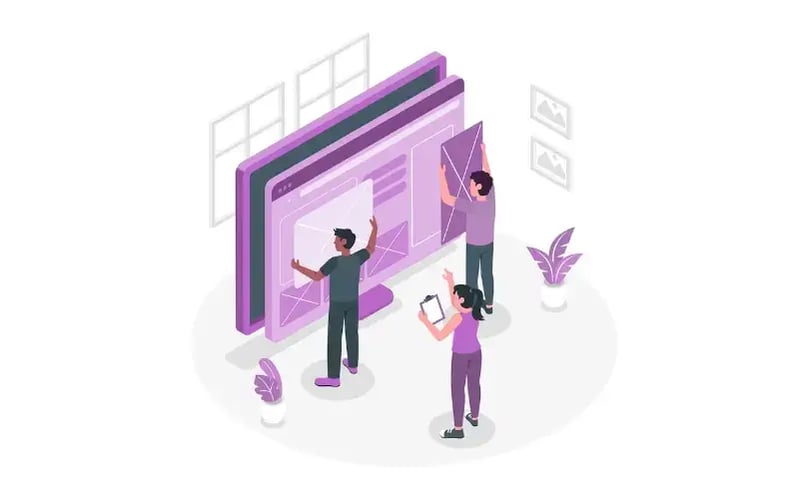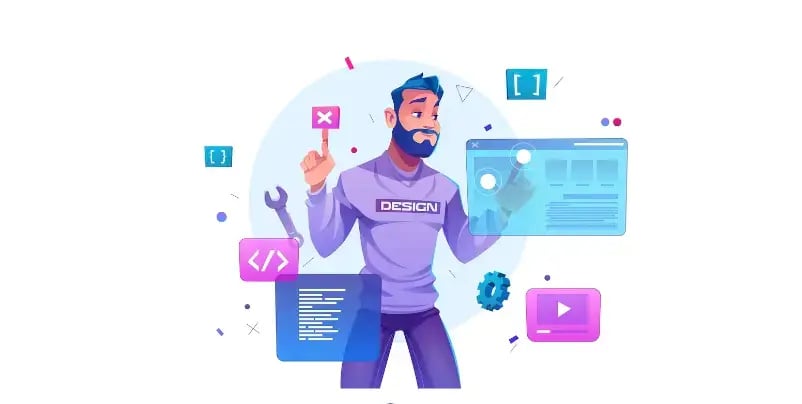In today's digital landscape, where first impressions matter more than ever, the visual marketing appeal of your website plays a crucial role in attracting and engaging visitors.
With the rapid advancements in technology, particularly in artificial intelligence, businesses now have access to powerful tools that can significantly enhance the visual appeal of their websites.
This article will explore the importance of visual appeal in website design and how AI design tools can help create stunning layouts, generate high-quality visuals, tailor content to individual users, and improve accessibility.

Importance of Visual Appeal in Website Design
When users land on a website, their initial impression is its visual design. An aesthetically pleasing website captures attention, creates a positive brand image, and instills trust in visitors.
For professionals seeking specialized web design for coaches, focusing on tailored visual strategies can significantly enhance user engagement and build trust with potential clients.
Visual appeal goes beyond simply using attractive colors and images; it involves the overall layout, typography, spacing, and consistency of design elements.
A visually appealing website looks professional and enhances the user experience, increasing engagement and conversions.
Also, attention to detail in selecting fonts and their appropriate pairing can significantly contribute to the overall visual appeal of a website.
Consistency in font styles and sizes across different site sections ensures a cohesive and polished look. Combining them makes it easier for visitors to explore the website and find what they want.
You can opt for website redesign services, if you are looking to revamp your website to enhance the visual appearance.

Introduction to AI Tools for Enhancing Visual Appeal
Artificial intelligence has revolutionized various industries, and web design is no exception.
AI-powered tools can analyze vast amounts of data, learn from patterns, and generate creative solutions to enhance the visual appeal of websites.
These tools leverage machine learning algorithms, computer vision, and natural language processing (NLP) to automate and streamline the design process.
How an AI Website Builder Helps Create Appealing Layouts & Designs
An AI website builder is a game-changer in the web design industry. This platform combines the power of AI with intuitive interfaces, allowing users to create visually stunning layouts and designs without any coding knowledge.
AI algorithms analyze user preferences, industry trends, and best practices to suggest design elements, color schemes, and layouts that are visually appealing.
These builders also offer a wide range of professional templates and layouts that you can customize to suit individual needs.
How AI Tools Generate High-Quality Images, Videos & Graphics
Visual content, such as images, videos, and graphics, is essential for engaging users and conveying information effectively.
AI tools can generate high-quality visuals using an image design tool that incorporates image upscaling and enhancement techniques, even from low-resolution or stock images.
This includes leveraging AI image generator tools to create entirely new visuals from scratch based on text descriptions.
Examples of these tools are Open AI's DALL-E 2, MidJourney, and Illustration Generator by Icons8. They can turn text into unique photos, art, and illustrations.
These techniques employed by AI tools enhance the quality of pictures, making them appear sharper, more vibrant, and visually appealing.
This capability is precious when working with limited resources or when high-resolution images are not readily available.
These tools can also automatically crop and resize images to fit different screen sizes, ensuring a consistent visual experience across devices.
Additionally, AI video editor tools can enhance videos, add special effects, and optimize them for faster loading and better playback.
How AI Tools Help Tailor Website Content to Individuals
Personalization is critical to providing a tailored user experience, and AI tools excel in this area.
AI-powered recommendation engines can deliver personalized content by analyzing user behavior, preferences, and demographic data.
Whether it's suggesting relevant products, articles, or offers, AI tools help create a dynamic and engaging user experience. This level of personalization enhances the website's visual appeal and increases user satisfaction and conversions.
Importance of Accessibility in Web Design
Accessibility is an often-overlooked aspect of web design, but it is crucial for ensuring inclusivity and reaching a wider audience.
An accessible website accommodates users with disabilities, such as visual or hearing impairments, by providing alternative formats and assistive technologies.
Having an accessible, catchy web design involves considerations like proper color contrast, alt tags for images, keyboard navigation, and closed captioning for videos.
Benefits of Using AI for Accessibility Enhancement
AI tools can significantly assist in making websites more accessible. They make your job easier and save a lot of your time and resources.
Using AI tools, designers can effortlessly identify and rectify accessibility issues, such as improper color contrast, missing alternative text for images, or inadequate keyboard navigation.
Here are some of the benefits that Artificial Intelligence provides to its users:
- AI-powered image recognition algorithms can automatically generate alt tags for images, making them accessible to visually impaired users.
- Natural language processing capabilities can provide real-time transcription services for live events or convert spoken language into text captions, benefiting individuals with hearing impairments.
- AI-powered chatbots and virtual assistants can support and assist users with disabilities, improving accessibility and navigation.
- AI algorithms can learn and adapt over time, continuously improving accessibility features based on user interactions and feedback.
- AI tools can automate the testing and evaluation of website accessibility, identifying issues and providing recommendations for improvement.
- Integrating AI into web design and development processes ensures equal access and an optimal user experience for individuals with disabilities.
- AI-powered tools demonstrate a commitment to inclusivity, foster positive user experiences, and help businesses meet legal and ethical obligations.
Conclusion
The visual appeal of a website and its accessibility are crucial factors in creating an engaging and inclusive online presence. AI tools provide robust solutions for enhancing both aspects.
By leveraging AI algorithms and technologies, businesses can create visually appealing layouts and designs, generate high-quality images and videos, tailor content to users, and improve accessibility for individuals with disabilities.
AI will play an increasingly important role in web design and development as technology evolves.
By embracing AI-powered tools, businesses can stay ahead of the competition, foster inclusivity, and create impactful online experiences that leave a lasting impression.
-Jun-15-2022-10-02-46-78-PM.png)